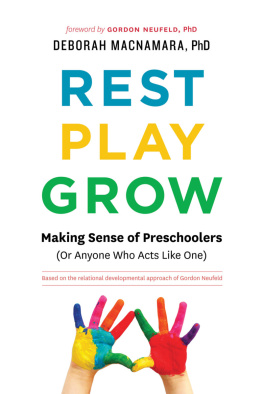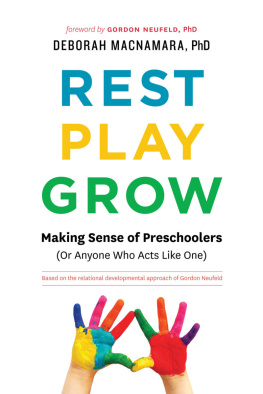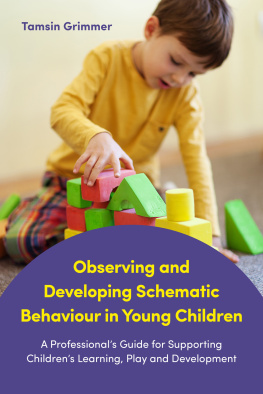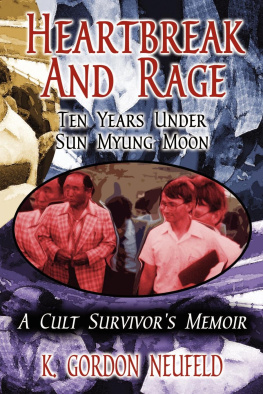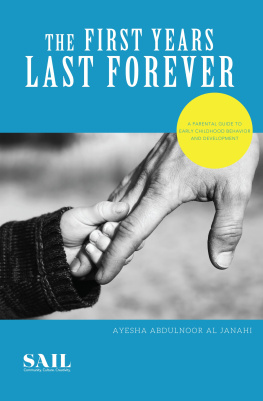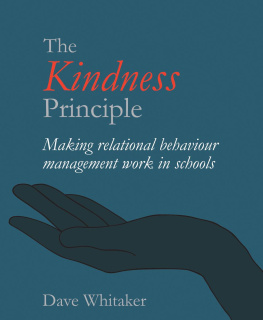Deborah MacNamara - Rest, Play, Grow: Making Sense of Preschoolers (or Anyone Who Acts Like One)
Here you can read online Deborah MacNamara - Rest, Play, Grow: Making Sense of Preschoolers (or Anyone Who Acts Like One) full text of the book (entire story) in english for free. Download pdf and epub, get meaning, cover and reviews about this ebook. City: Las Vegas, year: 2016, publisher: Aona Management, genre: Science. Description of the work, (preface) as well as reviews are available. Best literature library LitArk.com created for fans of good reading and offers a wide selection of genres:
Romance novel
Science fiction
Adventure
Detective
Science
History
Home and family
Prose
Art
Politics
Computer
Non-fiction
Religion
Business
Children
Humor
Choose a favorite category and find really read worthwhile books. Enjoy immersion in the world of imagination, feel the emotions of the characters or learn something new for yourself, make an fascinating discovery.
- Book:Rest, Play, Grow: Making Sense of Preschoolers (or Anyone Who Acts Like One)
- Author:
- Publisher:Aona Management
- Genre:
- Year:2016
- City:Las Vegas
- Rating:4 / 5
- Favourites:Add to favourites
- Your mark:
Rest, Play, Grow: Making Sense of Preschoolers (or Anyone Who Acts Like One): summary, description and annotation
We offer to read an annotation, description, summary or preface (depends on what the author of the book "Rest, Play, Grow: Making Sense of Preschoolers (or Anyone Who Acts Like One)" wrote himself). If you haven't found the necessary information about the book — write in the comments, we will try to find it.
Based on the work of one of the worlds foremost child development experts, Rest, Play, Grow offers a road map to making sense of young children, and is what every toddler, preschooler, and kindergartner wishes we understood about them.
Baffling and beloved, with the capacity to go from joy to frustration in seconds, young children are some of the most misunderstood people on the planet. Parents and caregivers struggle with these little ones, who are known for their extreme behaviour, from tantrums, resistance, and aggression to separation anxiety, bedtime protests, and not listening. The key to understanding youngsters lies in realizing that their challenging behaviour is not personal, nor is it a disorder or deficit.
Based on science and the relational developmental approach of renowned psychologist and bestselling author Gordon Neufeld, Rest, Play, Grow reveals how critical adults are in shaping the conditions to ensure young children flourish. This is the story of how young children develop, from their intense need for attachment and the vital importance of play to discipline that preserves growth. Engagingly written, with compassion for its subjects and rich with stories from them and their parents, Rest, Play, Grow will forever change the way you think of the preschoolers in your life.
Dr. Deborah MacNamara is a clinical counsellor and educator with more than twenty-five years experience working with children, youth, and adults. She is on faculty at the Neufeld Institute, operates a counselling practice, and speaks regularly about child and adolescent development to parents, childcare providers, educators, and mental health professionals. She continues to write, do radio and television interviews, and speak to the needs of children and youth based on developmental science. Deborah resides in Vancouver, Canada, with her husband and two children.
Praise for Rest, Play, Grow Rest, Play, Grow notes the preeminence of early parent-child attachment in optimal development, and it passionately affirms the primary value of play to childrens well-being and creativity. --Raffi Cavoukian, singer, author
This book is developmental science translated into practical love. --Gabor MatE, MD, co-author of Hold On to Your Kids
This is a must-read for every parent of a preschooler or younger. Read this and you will truly be your kids best bet. --Kristy Pillinger, editor-in-chief of Nurture Parenting Magazine
Deborah has translated the beautifully chaotic world of being a preschooler. If there is only one book you should read as a parent, this is the one. --Traci Costa, CEO of Peekaboo Beans
This is not a quick-fix script but, instead, presents a road map to better understand this amazing age in all its glorious imperfections. --Keyvan Hadad, MD, pediatrician
Rest, Play, Grow is a refreshing reminder of the importance of slowing down and allowing children to mature at their own pace, unhindered by societal expectations. --Lori Petro, TEACH through Love
Dr. MacNamara truly has the gift of writing, always grounding concepts in very relatable moments from her life and work as a researcher, professor, counsellor, and, of course, parent. --Genevieve Simperingham, Peaceful Parent Institute
Finally, a book for parents of young children that weds neuroscience and attachment research and is consummately useful! --Sil Reynolds, co-author of Mothering and Daughtering
Deborah MacNamara: author's other books
Who wrote Rest, Play, Grow: Making Sense of Preschoolers (or Anyone Who Acts Like One)? Find out the surname, the name of the author of the book and a list of all author's works by series.

